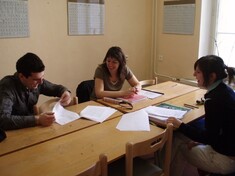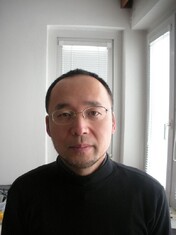Hirayama Koshi is the President of the Japanese Center in Brno, the President of Japanese teachers in the Czech Republic and a member of the Association of Japanese Teachers in Europe. After graduating from the Faculty of Political Sciences at Tokai University in Japan, he had come to the Czech Republic. For several years he had been teaching Japanese at Masaryk University in Brno, but after his teaching career, he founded The Japanese Center where he has been active until today.
Mr. Hirayama, could you tell us when did you come to the Czech Republic?
In July, 1998
What had made you come to the Czech Republic?
One of my professors advised me to teach Japanese at the Faculty of Philosophy at Masaryk University in Brno.
How do you find the Czech university system? What differences have you noticed between the Japanese and the Czech university style?
I find the Czech university system too old and too traditional, especially when we are talking about the administrative and teaching areas. It surprised me that at the faculty study department was employing only a few women when there were more than 6 000 students. Regarding the teachers, I noticed that a lot of them were coming to teach only one or two lessons per week. Due to this short time, plenty of them did not know what they were supposed to do exactly. I think that the teachers should reflect on this issue. Japanese universities are not perfect, but they do not have these types of problems.
How did you come up with an idea to establish the Japanese Center in Brno?
I stopped teaching Japanese in 2007 as I was not able to continue working at the faculty any longer. I was really disappointed and so I decided to establish my own school. This was the best decision in my life. Since then I’ve never had any stupid administration, financial and communication problems.
Tell us more about the Japanese Centre in Brno (The JCB).
My initial purpose, and the overall purpose of the JCB, was to teach Japanese in order to provide a better schooling and better jobs for students. But now, the purpose has totally changed. The most important purpose is not only the previous one, but also to help the students to study Japanese and the Japanese culture by THEMSELVES in the future. To study Japanese with me in the JCB looks like a life in a comfortable cradle. But someday, everyone has to leave the centre and go to another place. A person with long arms and long legs can’t return to a comfortable cradle. So, my job is not only to give the knowledge, but also to teach how to live and improve your situation using Japanese in the future.
How would you characterize your students?
I always try to communicate with them using the method of so-called „wet ways“ in Japanese. It means that I often ask them about their daily life, work, communication with friends and partners and so on in detail. I think that there is no European teacher who would dislike my way and I think these are one of the most important things when teaching. I adopted this method so that we can trust and rely on each other. By using it we can communicate much better and especially, make students accelerate in their Japanese studies.
How do you feel in the Czech Republic?
I’m from Tokyo and I had lived in Tokyo until I was 28 years old. In the Czech Republic I feel that there is so much space around me. I am really happy to have my own space (1 or 2 meters just for me).
We know that the Japanese mentality is very different from the European mentality. What difficulties have you encountered when trying to integrate?
The Europeans (and also the Americans) tend to unconsciously think that their cultures represent a WORLD STANDARD of how it should be. This is very dangerous for them, however, not for us. Just to give you an example the act of hugging. This custom is well interpreted in Europe and confirms the friendship among people. However, it’s too shameful to do this in an Asian country, especially in Japan. Furthermore, these kinds of acts are strictly forbidden in some countries. Such a „GOOD-LOOKING” custom does not always have a good interpretation in the world. The Europeans must understand and respect the way of thinking and customs which people from other countries have.
How was it for you to study Czech?
I have not studied Czech here because I have not had time at all yet. Of course, I find this language to be very difficult. However, the problem is not how difficult it is, but a little satisfaction you experience after studying. It takes so long and it requires a huge effort to study Czech. And after all, we can use this language only in the Czech Republic.
Is it important for you to keep in touch with your Japanese diaspora here in the Czech Republic?
It is not important at all. Of course, sometimes, I have to communicate with other Japanese people, but I do not always keep touch with them on purpose,.
Could you please tell us a bit about your family?
My wife is Czech and I have one son. To be frank with you, my opinion is that the Europeans should not get married with the Asians if they want to live peacefully. Unfortunately this is true in spite of world-wide communication among people.
How do you keep in touch with your family from Japan?
I sometimes call to Tokyo. Because no one in my family can use computer, I cannot send emails. So I have to use a normal telephone! On the other hand, I have realized that using the phone is the best way to communicate with those people who live far away from me. It has happened to me that or they misunderstand or I am being misunderstood when using email.
Thank you very much for sharing your experience with us.
Příloha: Full text (pdf) [106.6 kB, pdf]







